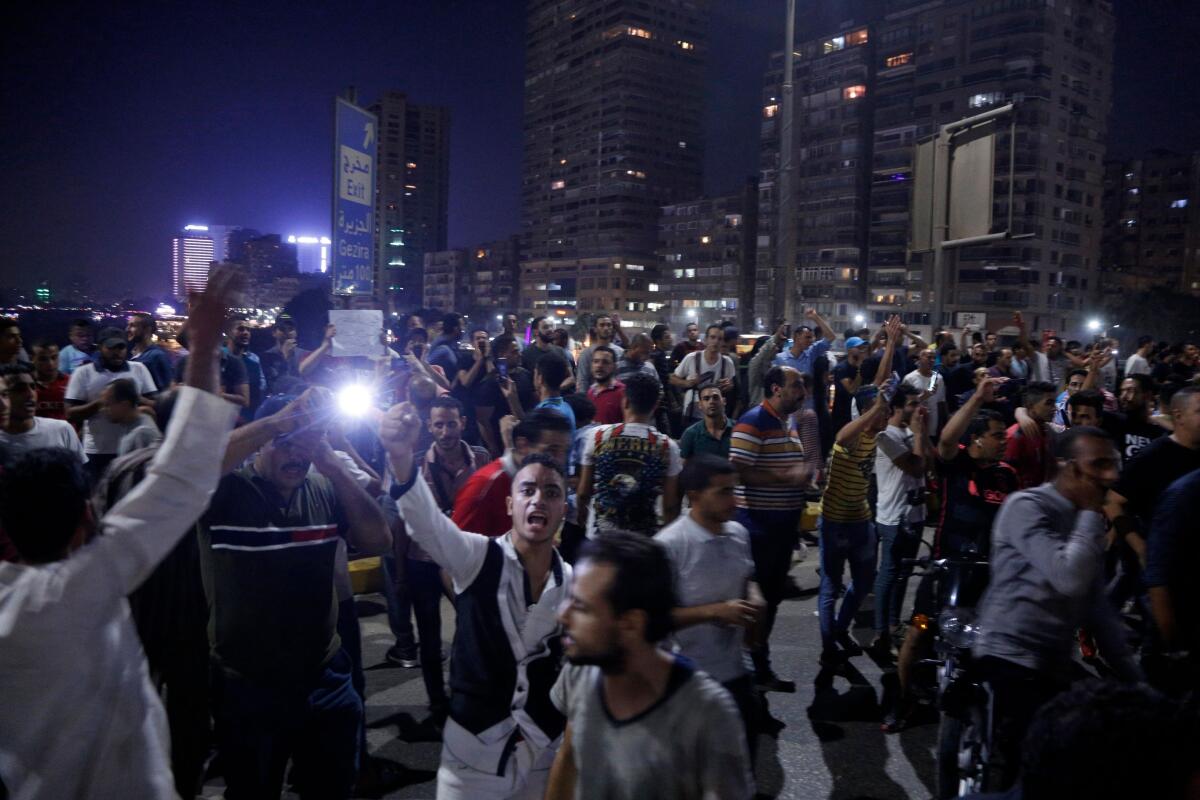New Egyptian protests hark back to days of mass demonstrations

- Share via
CAIRO — The smell of tear gas over the weekend brought a tear to the eye of 27-year-old Cairo resident Mohamed Maged.
“I was like, I’ve missed this,” said the recent electrical engineering graduate, who had stepped outside Friday night to catch a glance of an extremely unusual antigovernment protest at Tahrir Square in central Cairo. “I love this smell, I love tearing from it.
“It brings a lot of memories.”
For Maged and many others of the generation of the 2011 Egyptian revolution, a series of protests that broke out over the weekend in Cairo and several other Egyptian cities prompted memories, especially on social media, of a more hopeful time when hundreds of thousands of Egyptians took to the streets to peacefully topple longtime dictator Hosni Mubarak.
Following two more years of street protests and elections, and a military-led popular ouster of the country’s first democratically elected president, general turned President Abdel Fattah Sisi staged a harsh crackdown in 2013, rolling back freedoms and stifling dissent. Tens of thousands of people were left imprisoned and many others depressed or traumatized.
The protests that began Friday were small but took many by surprise because demonstrations have been all but outlawed since Sisi’s ascension.
On the day Sisi left for New York to attend the U.N.’s General Assembly, hundreds of mostly young, working-class Egyptians heeded an online call to take to the streets against government corruption. A second day of protests continued in the port city of Suez on Saturday.
Security forces fired the tear gas to disperse the demonstrators, some of whom called for Sisi — whom President Trump has referred to as “my favorite dictator” — to step down. More than 200 people were reported to have been arrested.
“I was so shocked people actually went out and protested on Friday,” said one 30-year-old Egyptian journalist who spoke on condition on anonymity.
“For the record, no one thought that the protests would spread like this on Friday,” wrote well-known blogger Zeinobia. “This is higher than my expectations in every way.”
Zeinobia said she had heard participants in a small flash protest close to her home in Giza chanting, “Leave, leave.” When she came to her window she “found the neighbors and the people sitting in nearby cafes all were watching in silence. We have not heard of this chant since 2013,” she said.
In an interview, Zeinobia urged caution about not getting carried away by the protests, saying more information was needed on the demands and motives of Mohamed Ali, a building contractor who prompted the protests. In a series of viral videos posted since early September, Ali, who is in exile in Spain, has accused the government of corruption and has called for demonstrations.
On Saturday, Ali posted another video urging a “million-man march” next Friday.
Others were also cautious about additional protests.
Alaa Abdel Fattah, a prominent political activist, said he was particularly concerned given his own experience. Fattah was arrested in late 2013 for allegedly encouraging protests outside the Egyptian parliament over a new constitution. After five years behind bars, he was released in March but is still required, for another five years, to report to a police station each night and stay there between 6 p.m. and 6 a.m.
Unlike some, Fattah says the protests have not made him nostalgic for the revolution, but have instead made him worry about the possibility of a future with “more deaths and disappearances.”
More to Read
Sign up for Essential California
The most important California stories and recommendations in your inbox every morning.
You may occasionally receive promotional content from the Los Angeles Times.










